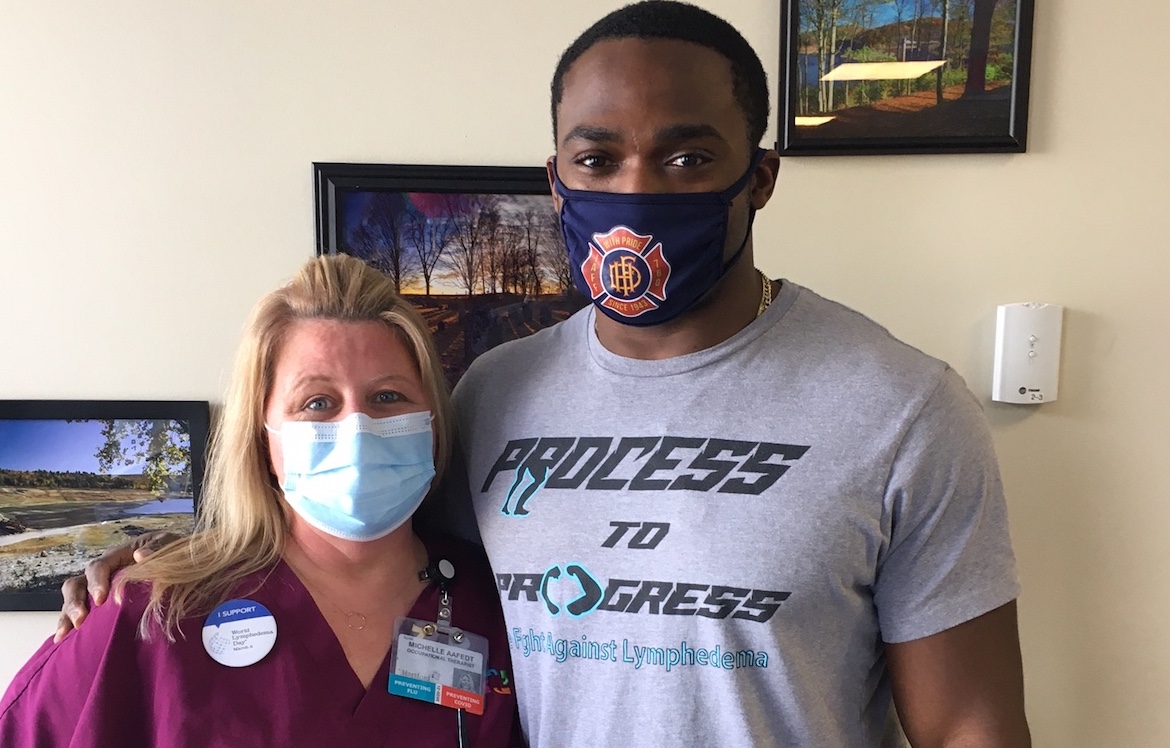When he was 15 years old, Dominique Rodgers was playing basketball with some friends when he went up for a rebound and came down awkwardly on his ankle.
He knew immediately that he had rolled it, but figured it was just a sprain, a minor injury and certainly nothing to be too alarmed about. When he got home, he put some ice on it, elevated his leg and went to bed.
The next morning he awoke to find his entire leg badly swollen, indicating a bigger problem than just a sprained ankle. A trip to Connecticut Children’s Medical Center provided the answer: Rodgers was diagnosed with lymphedema, a protein-rich swelling that can occur in any part of the body.
The swelling ranges from mild, hardly noticeable changes in the size of an arm or leg, to extreme changes that make the limb hard to use. While there is no known cure, lymphedema can be managed with conservative therapy, including, manual lymph drainage massage, multi-layer bandaging, consistent use of compression garments, exercise, and meticulous skin care, as well as regular follow-up visits with a therapist.
 Dominique Rodgers with Michelle Aafedt at Hartford HealthCare Rehabilitation Network’s Bloomfield clinic.
Dominique Rodgers with Michelle Aafedt at Hartford HealthCare Rehabilitation Network’s Bloomfield clinic.
After being diagnosed, Rodgers said he tried to manage treatment on his own, but soon recognized the need to seek medical attention. At 17, he had begun working with Michelle Aafedt, an Occupational and Certified Lymphedema Therapist at Mount Sinai Hospital, who would, ironically, also treat Rodgers’ mother with the lymphedema she developed from breast cancer.
Seventeen years after first diagnosed, Rodgers, now 32 and a firefighter in the West End of Hartford and a part-time EMT in Bloomfield, continues to receive treatment for his condition. He is also still working with Aafedt, now a therapist with Hartford HealthCare Rehabilitation Network in their Bloomfield outpatient clinic.
To raise awareness about lymphedema and offer support to those who are also battling the disease, Rodgers began the Instagram account @theprocess2progress, where he posts information and resources for his followers. He has also raised $1,500 to provide patients of Hartford HealthCare and Mount Sinai with compression garments to help with their treatments.
“Many people are still unaware of this disease and here I am, 17 years later, still battling the condition, but I do not let it define me or anything I choose to go after in life,” Rodgers said. “I will always have to manage this throughout my life to ensure I remain healthy. I just want everyone to know that everything takes time, everything is a process, I do not let it define me but I incorporate controlling it into my life and you can do the same.”
Click here for more information about Hartford HealthCare Rehabilitation Network’s Lymphedema program, which was recently recognized as an International Center of Excellence in Lymphatic Disease Care by the Lymphatic Education and Research Network.